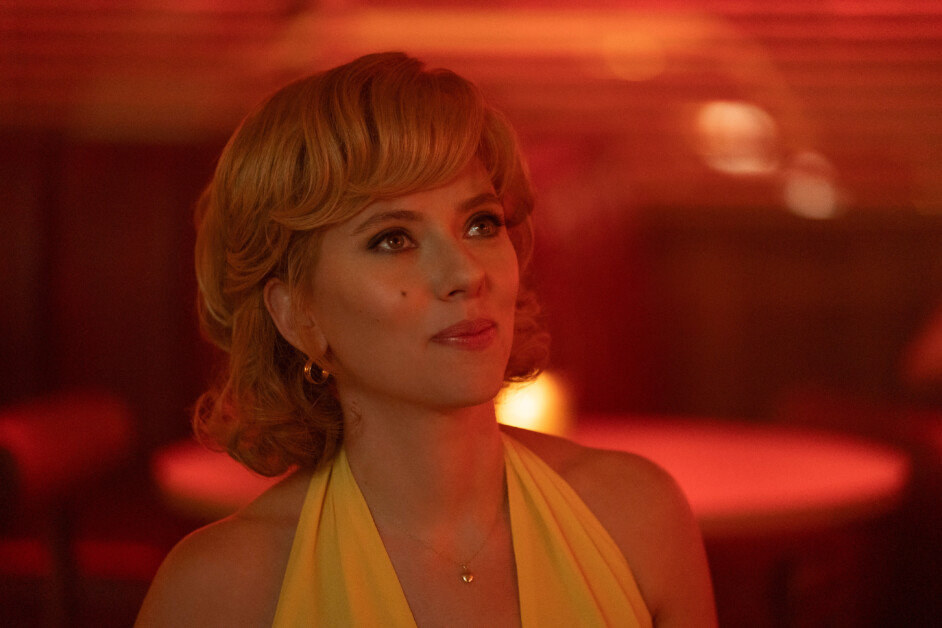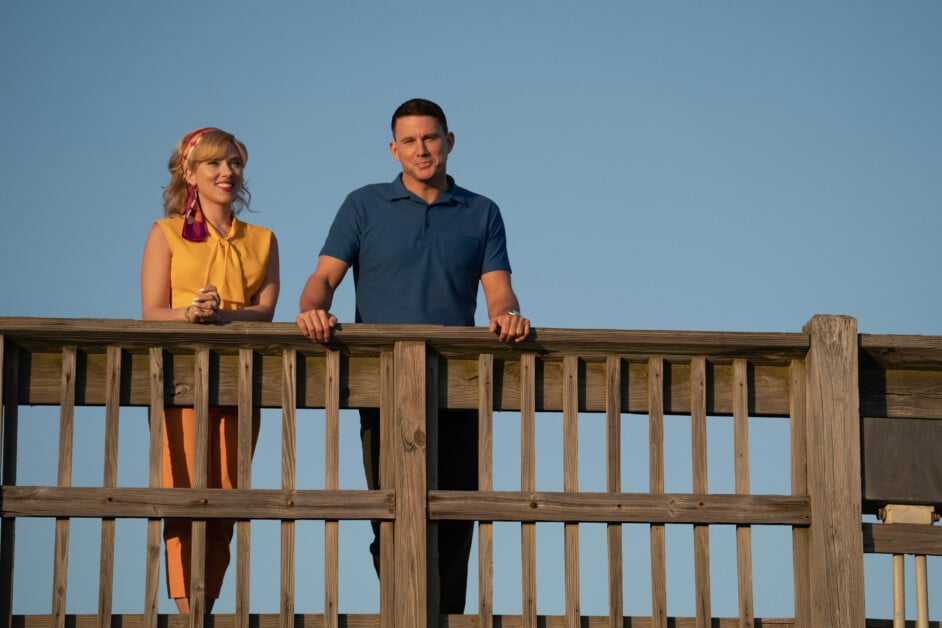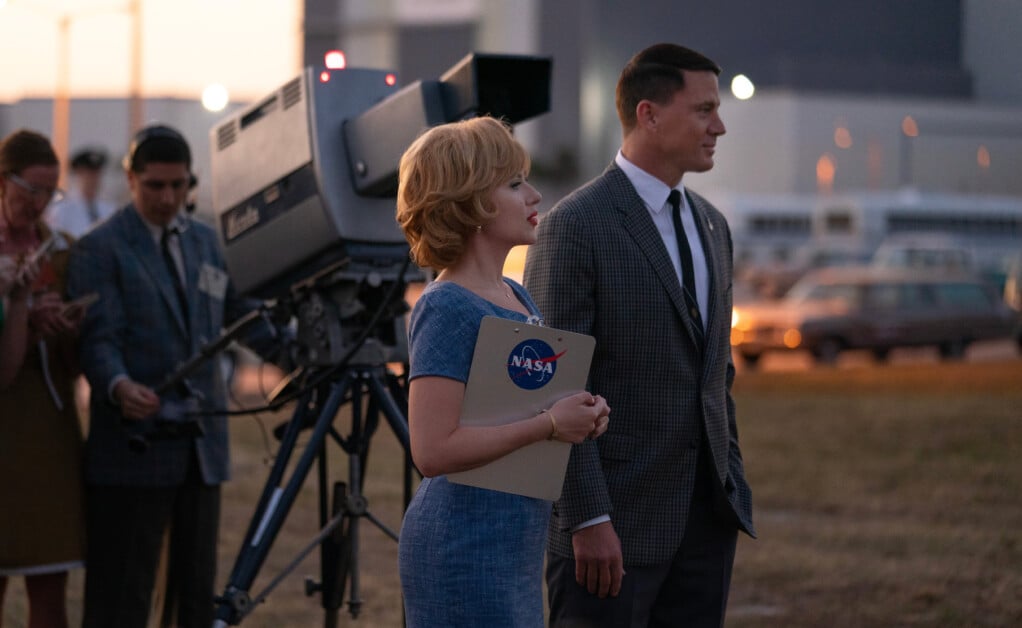What are the obligations of a rom-com?
Specifically, what are the obligations of a rom-com set against one of the most politically fraught eras of the 20th century? Let’s say a film uses the backdrop of the 1969 moon landing to get Scarlett Johansson and Channing Tatum to dance under the stars. Is that film then obligated to comment on the Cold War, the Vietnam War, or the political assassinations of Martin Luther King Jr. and Robert Kennedy? Would the film be malfeasant if it didn’t? Or is that asking too much of a movie where Johannson uses a fake baby bump to win a sales pitch and Tatum ambles around NASA in short-sleeved turtlenecks?
Director Greg Berlanti stumbles into those questions with Fly Me to the Moon, his film about the historic Apollo 11 mission. The mission was met with heavy skepticism, with the aforementioned political strife shifting the country’s priorities away from space travel. Basically, NASA had a severe public relations problem. The U.S. government taps Kelly Jones (Johannson), a marketing executive from New York, to fix it and raise the fledging department’s Q rating. Her efforts rankle Cole Davis (Tatum), Apollo 11’s launch director, who couldn’t care less about the frivolity of sponsorship deals when the country’s future is on the line. Kelly’s makeover of NASA is largely successful, and Kelly and Cole grow closer, but the stakes are far too high for failure. As such, the government (represented by Woody Harrelson), with Kelly’s begrudged participation, stages a concurrent, covert plan to fake the moon landing.

The film’s central tension isn’t so much how Kelly and Cole turn around NASA’s optics as whether it can peacefully coexist with its broader historical and cultural context. The film is easily at its best when leaning into the former. Berlanti infuses Kelly’s PR makeover with a zippy, bouncy energy that leans into the endeavor’s silliness while conveying its importance. He occasionally gets creative in Kelly’s barnstorming, with comic-book panel montages and fun needle drops. However, most of the movie’s energy comes from the NASA employees’ bewilderment and a sincere and sharp script. It’s a charming twist on the classic “fish out of water” trope: Kelly is such a force that NASA turns itself into a fishbowl for their collective benefit. The film kicks the chaos up a notch with the fake moon landing, as ad director Lance Vespertine (Jim Rash) rivals Kelly’s audacity and lands many of the film’s best jokes.
Where Fly Me to the Moon stumbles is pursuing loftier political engagement alongside its lighter comedic elements. The uneven tone is present almost immediately. The film opens with a montage cutting between NASA’s cultural ascent and footage of political unrest spurred by the Cold War, especially the Vietnam War. The contrast makes sense on paper: there’s no denying the close relationship between America’s cosmic ambitions and wanting to defeat the Soviet Union. In practice, it adds an uncomfortable weight. Berlanti never really strikes an appropriate balance between humor and gravitas. Sometimes, it works, like when Kelly demonstrates congressional vanity and hubris by playing to their egos with her Madison Avenue tactics. Most times, however, the film makes heavy-handed and ill-fitting proclamations about the defeat of communism and preserving the American experiment.

The cultural and political backdrop is important, but it often feels irrelevant to the central story, as well as Cole and Kelly’s budding romance. The heavier political ramifications frequently upset the momentum, just as the film settles into a pleasant, cheek-warming rhythm. They take up narrative space that might’ve been better suited to more scenes showing how Kelly and Cole fall for each other. They are a charming, opposites-attract pair, but there are too few scenes of clash and camaraderie. The relationship’s constitution is further tested by backstories that feel overwritten and melodramatic, even if they are well-intentioned. Berlanti’s inability to craft a cohesive tone that balances politics, romance, and comedy ends up shortchanging all three. It also leaves the actual liftoff of Apollo 11, built into near-mythic proportions by its character, feeling muted in execution, lacking wonder and awe.
What keeps Fly Me to the Moon mostly on track is a very good cast that relies on their charisma to fill in the rough patches. Scarlett Johannson is delightful as Kelly, a take-no-prisoners type who relishes upending peoples’ expectations of her. She looks like she’s having a blast, with a mischievous twinkle in her eye and a knowing smirk. While Kelly sits well within the Mad Men archetype, Johannson crafts a unique character that may be one of her best. Channing Tatum is less assured at Cole Davis, struggling to tap into the character’s everyman, patriotic solemnity. He’s more comfortable with the flustered comedy and the sweeping romance, developing great chemistry with Johannson. The film’s biggest surprise is Ray Romano, who has two of the film’s loveliest and most successful dramatic moments as Cole’s colleague Henry Smalls.
If romantic comedies must speak to their respective moments, Fly Me to the Moon reflects what not to do. Yet, the film is not without its charms, thanks to a dazzling Johannson and plenty of workplace hijinks. It successfully achieves liftoff, but its cumbersome political baggage keeps it from soaring high.
Fly Me To The Moon will debut exclusively in theaters on July 12, 2024, courtesy of Sony Pictures. The film will be available to stream on Apple TV+ at a later date.
If romantic comedies must speak to their respective moments, Fly Me to the Moon reflects what not to do. Yet, the film is not without its charms, thanks to a dazzling Johannson and plenty of workplace hijinks. It successfully achieves liftoff, but its cumbersome political baggage keeps it from soaring high.
-
GVN Rating 6
-
User Ratings (1 Votes)
6.3
A late-stage millennial lover of most things related to pop culture. Becomes irrationally irritated by Oscar predictions that don’t come true.






